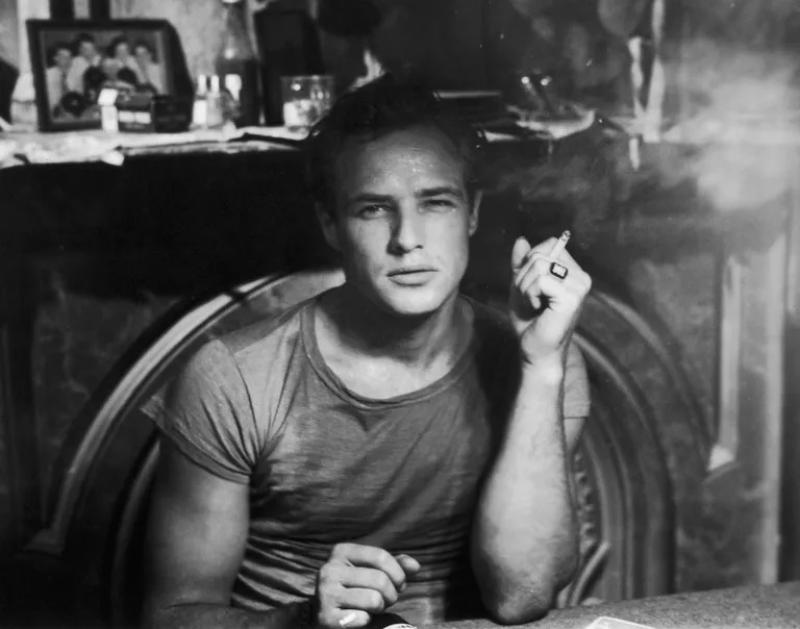Marlon Brando Biography
By: Christopher McKittrick

Marlon Brando Biography
Influential Star Considered One of the Greatest Movie Actors of All Time
:max_bytes(150000):strip_icc():format(webp)/GettyImages-2637961-5c4aa33846e0fb000177a11f.jpg)
Marlon Brando in a scene from 'A Streetcar Named Desire', adapted from the play by Tennessee Williams and directed by Elia Kazan for Charles K Feldman Group/Warner Bros. (Photo by Hulton Archive/Getty Images)
Marlon Brando was an American actor whose approach to performing influenced multiple generations of actors. In films like A Streetcar Named Desire (1951) and On the Waterfront (1954), Brando helped introduce a new style of acting to Hollywood and to audiences, while his later roles in films like The Godfather (1972), Superman (1978), and Apocalypse Now (1979) drew praise for his performances but made headlines for his challenging behind-the-scenes behavior.
Fast Facts: Marlon Brando
- Occupation: Actor
- Born: April 3, 1924 in Omaha, Nebraska
- Died: July 1, 2004 in Los Angeles, California
- Education: American Theatre Wing Professional School
- Key Acting Roles: A Streetcar Named Desire (1951), Viva Zapata! (1952), Julius Caesar (1953), The Wild One (1953), On the Waterfront (1954), The Godfather (1972), Last Tango in Paris (1972), Superman (1978), A Dry White Season (1989)
- Famous Quote: "It is a simple fact that all of us use the techniques of acting to achieve whatever ends we seek." —Brando's introduction to The Technique of Acting by Stella Adler
- Fun Fact : Brando was ranked as the fourth-greatest male star by the American Film Institute in its 1999 "100 Years... 100 Stars" list.
Early Life and Broadway
Marlon Brando was born in 1924 in Omaha, Nebraska. As a teenager living in Libertyville, Illinois, Brando worked at the local movie theater as an usher. Brando performed on stage as a student at Shattuck Military Academy in Minnesota, and in 1942 he followed in his eldest sister's footsteps by moving to New York City to learn acting at the American Academy of Dramatic Arts (Jocelyn made her Broadway debut earlier that year).
The primary influence on Brando's acting style came from his work in New York with Stella Adler, whose techniques based on Russian performer Konstantin Stanislavski's approach to acting came to be called one of several types of "method acting," though Brando himself disliked the term. Nevertheless, Brando would be strongly identified with both the positive and negative associations of method acting for his entire career.
After performing in (and subsequently getting kicked out of after accusations of being difficult to work with) regional productions in New York, Brando made his Broadway debut in 1944's I Remember Mama . Over the next few years, he gained positive reviews and several awards for his Broadway performances.
Brando's final Broadway role was his most famous. He originated the role of the violent, working-class character Stanley Kowalski in Tennessee Williams' 1947 play A Streetcar Named Desire . Brando's performance was critically acclaimed, and he reprised the role in the 1951 film adaptation (Brando's second film performance). The success of the film turned Brando into a major film star and resulted in Brando's first Academy Award nomination for Best Actor, which he followed with three consecutive nominations.
Hollywood Star
Brando received additional acclaim and Oscar nominations for his roles in 1952's Viva Zapata! , in which he starred as Mexican Revolution leader Emiliano Zapata, and in 1953's Julius Caesar , in which he played Mark Antony in the adaptation of William Shakespeare's drama. That year Brando also starred in one of his most iconic roles as an outlaw motorcycle gang leader in The Wild One . The image of Brando riding a motorcycle in a cap, leather jacket, and blue jeans became one of the most enduring cinematic images of the early 1950s.
Brando finally won his first Best Actor Oscar for his performance in 1954's On the Waterfront . In the film Brando plays former boxer Terry Malloy, who threw a fight to help his brother win money and went on to work as a longshoreman. After witnessing a murder ordered by the union boss, Malloy is conflicted on whether he should cooperate with investigators. Malloy's "I coulda' been a contender" speech is one of the most famous in film history.
:max_bytes(150000):strip_icc():format(webp)/marlon-brando-with-oscar-515388418-5c6a55b0c9e77c000119fb6b.jpg)
Other key roles for Brando in the 1950s were Guys and Dolls (1955) and Sayonara (1957), though none of his films in the latter half of the decade equaled his successes in the earlier half. Brando began the 1960s with the Western One-Eyed Jacks (1961), which was the only film Brando ever officially directed, and the very troubled production Mutiny on the Bounty (1962).
The production of Mutiny on the Bounty went significantly over-budget and employed three directors, including an uncredited Brando, who also made uncredited rewrites to the script. Both films lost significant money at the box office, and the press reported that Brando caused friction on the sets, including expensive demands on the studios, which caused many of the budget issues.
Though Brando appeared in ten more films in the 1960s, none reached the height of his 1950s successes either with critics or at the box office, with the exception of 1967's Reflections in a Golden Eye , in which Brando plays a military officer with conflicted feelings regarding his sexuality. Though the film was not a financial success, it was Brando's most acclaimed role of the decade.
1970s Comeback: The Godfather to Apocalypse Now
Though Paramount Pictures was hesitant with the decision, director Francis Ford Coppola cast Brando as Don Corleone in his film adaptation of Mario Puzo's bestselling crime novel The Godfather . Brando's performance as the aging, but still viciously powerful mafia boss has been recognized by critics and audiences as one of the greatest in film history and continues to be celebrated in pop culture.
:max_bytes(150000):strip_icc():format(webp)/the-godfather-71715631-5c6a54d346e0fb0001319c47.jpg)
From left to right, Salvatore Corsitto as Bonasera, James Caan as Santino 'Sonny' Corleone and Marlon Brando (1924 - 2004) as Don Vito Corleone in 'The Godfather', 1972. Bonasera asks Don Corleone to avenge the brutal rape of his daughter. Silver Screen Collection / Getty Images
Though Brando won the Academy Award for Best Actor for his performance as Don Corleone, he did not attend the ceremony and sent Sacheen Littlefeather, an activist and president of the "National Native American Affirmative Image Committee," to refuse the Oscar and instead deliver a speech about Hollywood's portrayal of Native Americans.
Brando's next film was the controversial 1972 erotic movie Last Tango in Paris , about a middle-aged American and his relationship with a young French woman played by Maria Schneider. The film's sexual content caused it to be banned in several countries and faced protests during its U.S. release, but it was a worldwide hit.
Though Brando still could turn in acclaimed performances, such as his Emmy Award-winning performance in the 1977 miniseries Roots: The Next Generations , his often-difficult on-set behavior drew the ire of filmmakers he worked with. He pulled out of a cameo appearance in 1974's The Godfather Part II , forcing last-minute script rewrites. While playing Superman's Kryptonian father Jor-El in 1978's Superman , Brando refused to learn his lines and read his dialogue from cue cards (an increasingly common practice for the actor).
After Coppola cast him as Colonel Walter E. Kurtz in the 1979 Vietnam War epic Apocalypse Now , Brando reported to set overweight and with little knowledge of the script. Though the films and Brando's performances were critically acclaimed, the on-set reports did not help Brando's dwindling reputation. After Brando's next film, the 1980 thriller The Formula , was a critical and commercial failure, he announced a retirement from acting that lasted nearly a decade.
Final Years
Upon returning to film in 1989's A Dry White Season , Brando received a Best Supporting Actor Oscar nomination for his performance as an anti-apartheid lawyer in South Africa. Brando's role in the 1990 comedy The Freshman , in which he parodies his performance as Don Corleone, was also a minor hit, as was the 1995 romantic comedy Don Juan DeMarco which features Brando in a supporting role. However, Brando never again enjoyed commercial or critical success in his final films, some of which, like his performance as the title character in 1996's The Island of Dr. Moreau , received some of the harshest criticism of his career.
During this period Brando also experienced tragedies in his personal life, including his son Christian's conviction for manslaughter and the suicide of his daughter Cheyenne in 1995. His last movie was the 2001 crime comedy The Score , which co-starred Robert De Niro, who played a younger version of Vito Corelone in The Godfather Part II (Brando and De Niro are the only actors who both won Oscars for playing the same character).
Brando's final years were marked by frequent appearances in tabloids regarding his health, weight gains, family life (he fathered at least eight children with his three wives and multiple affairs and adopted three others), and friendship with another tabloid favorite, pop star Michael Jackson. Brando died at UCLA Medical Center in Los Angeles on July 1, 2004 from respiratory failure and congestive heart failure.
Legacy
In addition to his two Best Actor Oscars (though he infamously refused to accept the second one) and eight total Oscar nominations, Brando also won major actor awards from the British Academy, the Golden Globes, and from many major film festival and critical organizations throughout the U.S. and Europe. Brando received a star on the Hollywood Walk of Fame in 1960. He is regularly cited by critics and other actors as one of the greatest actors and biggest stars in Hollywood history.
Sources and Further Reading
- Brando, Marlon and Robert Lindsey. Brando: Songs My Mother Taught Me. Random House, 1994.
- Kanfer, Stefan. Somebody: The Reckless Life and Remarkable Career of Marlon Brando. Vintage, 2008.
- Listen to Me Marlon. Directed by Stevan Riley. Universal Pictures, 2015.



